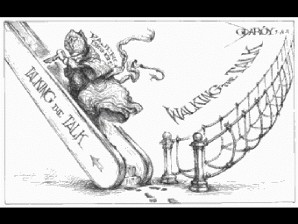President Aquino may have wanted the Supreme Court to resolve the elemental issue at the heart of the Hacienda Luisita controversy for him. A resolute ruling of the Court would have given the President cover, to finally effect the redistribution of land to the farm workers of his family’s hacienda. Now that a 6-4 majority of a 13-person Court has thrown back the problem to the farmers, the original landowners and the Department of Agrarian Reform—in other words, to the first parties—the President must realize that the true resolution of the problem rests with him.
The confusing Court decision invalidated Hacienda Luisita’s stock distribution option, and then called on Luisita’s farmers to choose between land distribution and the stock option! This legal wishy-washiness can only perpetuate the legal disputes that have turned the sprawling Cojuangco property in Tarlac, which the President’s father once managed and which the President’s mother once called home, into the sorriest example of the limits of agrarian reform. If the controversy continues to drag on for years, Mr. Aquino will only have himself to blame. And a dismayed nation will pin the blame on him.
We wish to be as clear as possible. It does not matter if the President owns only a tiny fraction of the hacienda. It does not matter if the President sells his minuscule share in the hacienda. It does not matter if the President is not in fact the paterfamilias of the extended Cojuangco clan. What matters is that much of Luisita land remains undistributed to its farmers despite, or because of, two Aquino presidencies.
Some may have already forgiven Cory Aquino for keeping Luisita intact. We doubt whether the same kind of forgiveness awaits her son at the end of his term.
The basic issue is social justice. Those who till the land must own the land they till. While we can trace some of the roots of this fundamental principle to the grievances that helped lead to the Revolution in 1896, it became a national issue in the 1930s, and partially became official policy in the 1960s. When the Marcos dictatorship was dismantled in the 1980s, one of the first improbable victories of the immediate post-Marcos era was the drafting of a strong constitutional mandate for agrarian reform, followed by the unlikely passage of the Comprehensive Agrarian Reform Law. Today, hardly anyone disputes that agrarian reform is necessary, or a question of justice.
And yet here we are.
If the national interest requires that those who till the land must own the land they till, then any attempt to avoid the redistribution of land must run against the national interest. That, unfortunately, is the true import of the stock distribution option; it dilutes the basic principle and violates the constitutional mandate of agrarian reform. And that, unfortunately, is the true meaning of the various attempts by the Cojuangco family to keep Luisita intact through such initiatives as the SDO scheme. They dilute the basic principle and violate the constitutional mandate of agrarian reform. And they run against the national interest.
The essential questions are simple and stark. Is the mode of stock distribution, already disallowed in the law that extended the Comprehensive Agrarian Reform Program, in fact unconstitutional? Chief Justice Renato Corona thinks it is. We think so too, and we encourage the President to stay true to his political ideals and say so too.
Can the President afford to stand idly by while the wheels of justice continue to grind ever so slowly? Some of his closest allies, such as the Akbayan party-list group, think not. We share that view too, and we encourage the President to stay true to the lessons he learned from his martyred father and take the initiative.
Is the Luisita issue condemned to languish in the Supreme Court’s endless docket? Some observers think the Cojuangco family can end the dispute by themselves. We tend to agree, and we encourage the President to convene a family council and force the issue of redistribution. Forget the cynical subterfuge of the stock plan; it isn’t worthy of the heroes in the family.


